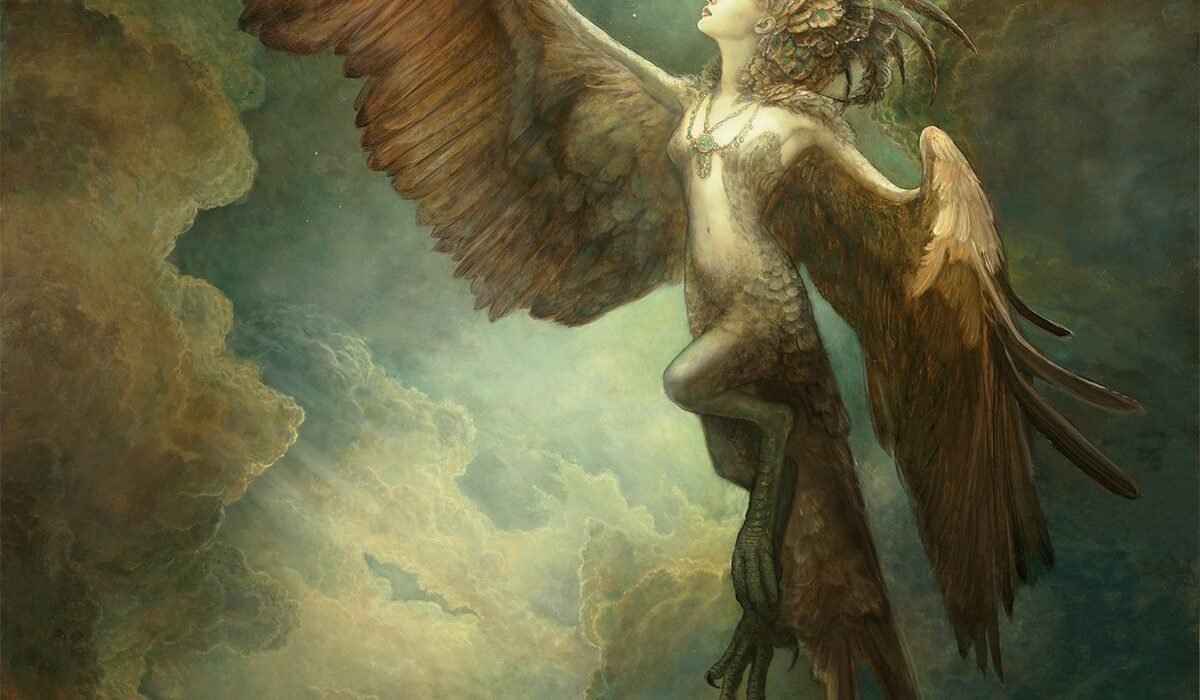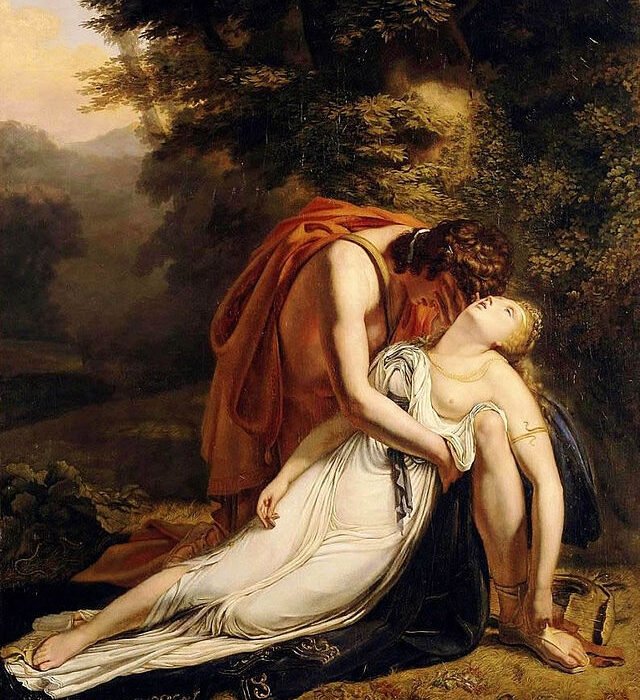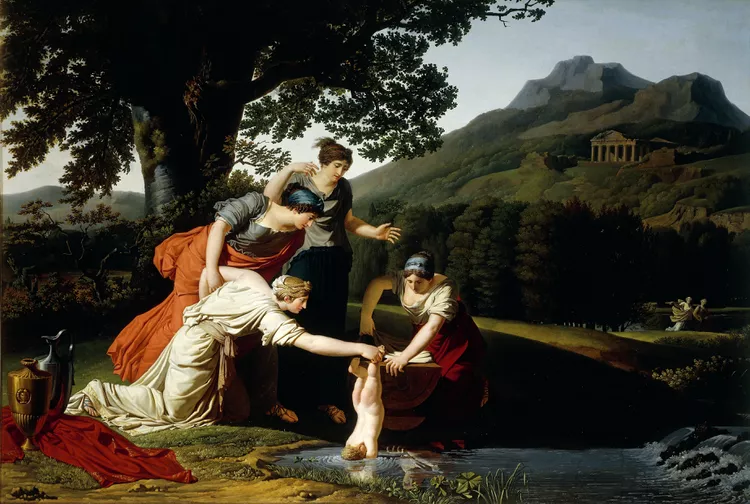Among the countless myths spun by the imagination of the ancient Greeks, few shine as brightly as the tale of the Garden of the Hesperides. This garden was no ordinary paradise; it was said to be hidden at the farthest edge of the world, where day meets night, where the mortal realm fades into the divine. Within it grew a tree unlike any other, heavy with fruit that glistened like molten sunlight—the golden apples of immortality.
The story of the Hesperides is a story of wonder, temptation, and the eternal human desire for what lies beyond reach. It has been retold for centuries, echoing through the works of poets, philosophers, and historians. It is a myth that bridges the divine with the human, the natural with the supernatural, and the symbolic with the real. To step into the Garden of the Hesperides is to step into one of the most enchanting corners of Greek mythology, where beauty and danger, life and death, coexist in eternal balance.
Who Were the Hesperides?
The Hesperides were the nymphs of the evening, often called the “Daughters of the Evening Star.” Their very name comes from the Greek word Hesperos, meaning “evening.” In different traditions, they were said to be the daughters of Nyx (Night) or of Atlas, the Titan who held up the sky. Their number varied—sometimes three, sometimes four, sometimes even seven—but they were always guardians of beauty, mystery, and twilight.
The Hesperides embodied a unique kind of femininity: alluring, secretive, and eternal. They tended their garden with care, singing sweet songs that echoed across the horizon. They were often portrayed as both gentle caretakers and dangerous seductresses. Like the Sirens, their voices could captivate, but unlike the Sirens, they guarded not a perilous sea but a sacred treasure.
The Hesperides were not alone in their guardianship. At the heart of their garden stood the great tree of golden apples, a wedding gift to the goddess Hera, planted by Gaia, the Earth herself. This tree was so precious that Hera set another guardian to watch over it: Ladon, a massive serpent or dragon, coiled endlessly around its trunk, hissing and alert, with a hundred heads in some versions. Together, the serpent and the nymphs created an aura of both enchantment and danger, ensuring that no mortal—or even god—could easily claim the apples.
The Golden Apples: Gifts of Immortality
What made the apples so precious was not merely their radiant beauty, but their power to grant immortality. In the myths, anyone who tasted the golden fruit would gain everlasting life or divine strength.
The apples represented more than just eternal youth. They symbolized divine favor, forbidden knowledge, and the eternal human desire to transcend mortality. In a way, they paralleled other mythical fruits and treasures found in cultures across the world: the apple of Eden in Judeo-Christian tradition, the peaches of immortality in Chinese myth, and the mead of the gods in Norse lore.
But the apples were not meant for mortals. They belonged to Hera, queen of the gods, who kept them as a divine secret. To attempt to steal them was to defy not only the guardians of the garden but the will of Olympus itself. And yet, as in many Greek myths, temptation and fate brought mortals and heroes alike into contact with this forbidden fruit.
The Hero’s Quest: Heracles and the Eleventh Labor
The most famous tale of the Garden of the Hesperides comes from the Labors of Heracles. As punishment for past sins, Heracles was tasked with twelve impossible feats. The eleventh was among the most daunting: he was commanded to retrieve the golden apples.
The journey to the Hesperides was itself a trial. The garden was said to lie beyond the known world, at the edge of Oceanus, the great river that encircled the earth. Some placed it in North Africa, near the Atlas Mountains; others thought it was hidden in the western seas, near modern-day Spain or the Canary Islands. In truth, it lay in the realm of myth—always just beyond reach.
Heracles faced countless obstacles before even reaching the garden. In one version, he encountered Prometheus, the Titan chained to a rock for giving fire to mankind. Heracles freed him by slaying the eagle that tormented him daily. In gratitude, Prometheus offered advice: Heracles should not try to steal the apples himself but instead enlist the help of Atlas, the Titan condemned to hold up the sky.
Heracles approached Atlas and struck a bargain. He would hold the sky on his shoulders if Atlas would fetch the apples. Atlas agreed, finding joy in being momentarily free of his cosmic burden. He returned with the fruit, but he schemed to leave Heracles holding the heavens forever. Heracles, ever cunning, pretended to accept but asked Atlas to briefly take back the sky so he could adjust his cloak. When Atlas did, Heracles took the apples and walked away, leaving the Titan trapped once more.
This tale illustrates not only Heracles’ strength but his cleverness. It also highlights a recurring theme in Greek mythology: that even the strongest heroes needed wit as much as might to succeed.
Other Seekers of the Apples
Heracles was not the only one to encounter the Hesperides’ golden fruit. In some myths, Eris, the goddess of strife, used a golden apple to spark the most famous conflict in all mythology. At the wedding of Peleus and Thetis, she tossed an apple into the crowd inscribed with the words “For the fairest.” Hera, Athena, and Aphrodite all claimed it, leading to the Judgment of Paris and eventually the Trojan War.
In this version, the golden apple symbolizes not immortality but temptation, vanity, and the seeds of discord. It reminds us that beauty, when contested, can lead to destruction.
Some versions even suggest that the apples were the same as those given to Hippomenes by Aphrodite, which he used to distract Atalanta during their fateful race. The golden fruit thus became symbols of both divine power and human passion, capable of shaping destinies in ways both wondrous and tragic.
The Symbolism of the Garden
The Garden of the Hesperides is more than just a mythical orchard. It is a powerful symbol that has been interpreted in many ways. At its core, it represents a lost paradise, a place of perfection and beauty that mortals can glimpse but never truly claim.
The golden apples themselves are symbols of the unattainable—immortality, divine favor, eternal youth. For the Greeks, who believed that even heroes could not escape death, the apples embodied the ultimate temptation. They represent both desire and danger, the dream of transcending human limits and the peril of defying the gods.
The Hesperides, with their songs and beauty, symbolize allure and mystery. They embody twilight, the liminal space between day and night, life and death, mortal and divine. To encounter them is to step into a threshold where the rules of the ordinary world no longer apply.
Possible Real-World Inspirations
As with many Greek myths, scholars have speculated that the Garden of the Hesperides might have roots in real geography or ancient traditions. Some point to the Atlas Mountains in Morocco, where the myth places Atlas himself, as a possible source of the story. Others suggest the islands of the western Mediterranean, such as the Canary Islands, as echoes of the mythical garden at the edge of the world.
The golden apples themselves may have been inspired by exotic fruits known to the Greeks through trade, such as oranges, which were not native to the Mediterranean but came from the East. To ancient eyes, such fruits would indeed have seemed like treasures of gold.
These possible connections highlight how mythology often blends imagination with reality, weaving together landscapes, natural wonders, and cultural exchanges into timeless stories.
The Legacy of the Myth
The Garden of the Hesperides has endured for millennia, inspiring poets, painters, and storytellers. The image of golden apples glistening in a hidden garden has appeared in Renaissance art, medieval romances, and modern literature. Writers such as Hesiod, Pindar, and Apollonius of Rhodes preserved the tale, while later artists and philosophers reinterpreted its meaning.
In art, the Hesperides often appear as beautiful maidens reclining beneath the apple tree, while Ladon coils menacingly around its trunk. In modern times, the myth continues to inspire fantasy stories and even science fiction, where the garden becomes a metaphor for paradise lost, forbidden knowledge, or the promise of eternity.
The story resonates because it touches on universal themes. Who among us has not longed for immortality, for beauty that endures, for a paradise that lies just beyond the horizon? The myth endures because it speaks to the eternal human struggle: the desire to reach for the divine, even at great risk.
The Garden as a Reflection of Humanity
At its heart, the tale of the Garden of the Hesperides and the golden apples is a mirror of humanity itself. It reflects our curiosity, our longing for more than life allows, our temptation by beauty and power, and our inevitable struggle with limits.
The apples shine with promise, but they also carry danger. They symbolize the paradox of desire—that what we most long for is often what we cannot safely have. They remind us that immortality, though seductive, comes at a price. And they teach us that wisdom lies not only in strength but in knowing when to reach and when to let go.
The garden, hidden at the edge of the world, is not just a place in myth but a symbol of the human imagination itself. It is the unreachable horizon that drives us forward, the mystery that fuels our creativity, the twilight where dreams and reality meet.
Conclusion: The Eternal Twilight
The Garden of the Hesperides and the golden apples remain among the most enchanting myths of Greece because they capture something timeless: the tension between mortality and immortality, desire and restraint, beauty and peril.
To walk into the garden is to step into a world where the ordinary dissolves into the extraordinary, where every fruit gleams with promise and every shadow hums with danger. The golden apples remind us of humanity’s eternal dream of escaping the bonds of time, of reaching for a life beyond death.
Yet the myth also warns us: immortality is not easily won, nor is it always a gift. Sometimes it is temptation itself, luring us away from the fragile beauty of mortal existence.
And so the Garden of the Hesperides remains, not in geography but in imagination, an eternal twilight at the edge of the world where golden apples glimmer, waiting for the daring, the foolish, and the wise to seek them once again.






